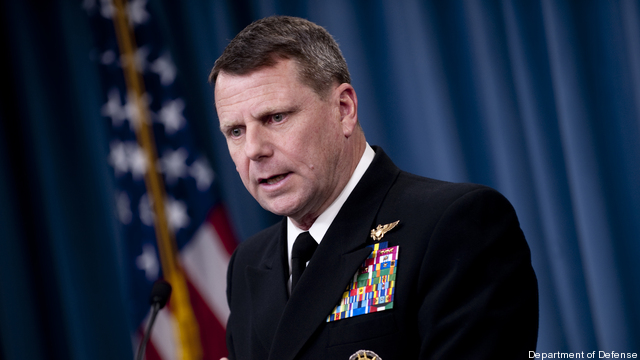‘We’re Terrified’ Of Sequestration’s Impact On Readiness: Navy 4-Star
Posted on
 CRYSTAL CITY: Navy readiness is already under strain, America’s top admirals say. And looming budget cuts will only make things worse. And they are very worried — “terrified” about some effects — about just how bad this may get.
CRYSTAL CITY: Navy readiness is already under strain, America’s top admirals say. And looming budget cuts will only make things worse. And they are very worried — “terrified” about some effects — about just how bad this may get.
The automatic budget cuts known as sequestration are set to slice 8.8 percent out of Navy operations and maintenance funding — and about the same from almost every other federal government program — starting in March. [Click here for a Congressional perspective on how hard it is to get a sequester deal]. If Republicans and Democrats can’t come to terms on how to avert the cuts, Deputy Secretary of Defense Ash Carter has told the Navy to delay or cancel the regular “availabilities” in which ships are tied up in port for major maintenance.
“Many of those availabilities are at risk,” Adm. William Gortney, head of US Fleet Forces Command, told the audience at the Surface Navy Association’s annual conference this morning. “We are terrified about that.”
Gortney echoed many of the concerns that Vice Adm. Tom Copeman, Commander of Naval Surface Forces, raised at the conference yesterday. But Gortney put a more positive spin on them. “Despite the Early Bird articles” — a reference to Breaking Defense’s story on Copeman, which was picked up by the Pentagon’s official clipping service — “I feel pretty good about where we’re headed in the future with the surface navy,” Gortney said. While the Navy has readiness challenges, the admiral argued, it’s making real progress on all of them.
That doesn’t mean Gortney is sanguine about the whole vast enterprise — from training to maintenance to munitions and staff planning — by which the Navy gets ships ready for action today. “Is our current effort both effective and affordable?” he asked. “No!” chorused many in the audience of Navy officers and industry executives.
“It wasn’t effective in our last 10 years, when we were flush with cash,” Gortney went on. “In the future, it’s not going to be effective or affordable.”
Affordability takes center stage because sequestration isn’t the only fiscal scare on the horizon. Gortney noted that historically, US military spending falls by 20 percent or more after each major conflict, while the 2011 Budget Control Act’s $487 billion, 10-year cut only comes to about 10 percent. “To be honest, that wasn’t real hard to accept,” Gortney said of the BCA. “We’re going to see some more significant cuts.”
The question is how much, and how those cuts will come — a matter of tremendous, indeed almost crippling uncertainty in both the military and the defense industry. “It could be another Budget Control Act. It could come in sequestration, or it could come in little ankle-bitters every year,” with annual fights over just how much to cut, Gortney said. “In my mind, that’s really the worst scenario, the little ankle-biters,” because it prolongs the uncertainty and sabotages long-term planning.
Whatever happens, said the Admiral, “I’m not going to Kennedy the fleet”: That is, he’s not going to repeat the maintenance mistakes of the past that led to the aircraft carrier Kennedy being decommissioned in 2007. “To be honest, we need that ship today, and we don’t have it because we didn’t take care of it correctly,” he said. “By not funding her [maintenance] availabilities correctly over a period of a decade, we’ve paid that price.”
Across the board, Gortney said, the Navy is working to undo the errors of the past. “We underfunded maintenance and we chose not to look at things like tanks [i.e. the interiors of fuel tanks] for 10 or 12 years,” he said. But now — assuming sequestration doesn’t strike — ‘we’re almost fully funding the availabilities,” Gortney said. “We’re going back into our tanks.”
Likewise, Gortney said, “we made some manning decisions that didn’t work out,” reducing crews on the assumption new methods would make for more efficient maintenance. Instead, “the work level on the ship went up.”
Perhaps most troubling, “we tried to look at some revolutions in training [sailors] that didn’t quite pan out,” Gortney said. “We just haven’t given them the training they need.”
But now, Gortney insists, “we have brought the schoolhouses back,” found billets for more technical experts aboard ships, and instituted a brand new “Basic Indoctrination” program for new surface warfare officers: “Those first ensigns graduated from BDOC a month ago,” he said.
Overall, the Navy’s made great progress on readiness — but “it’s fragile,” the admiral concluded. “My job is to shore that up.”
The question is whether the political system will let him do that. Gortney admirably dodged a question from Breaking Defense about what he would ask Congress to do. What he did say: “It’s a democracy. It’s not always pretty. [But] I wouldn’t want to live anywhere else.”
Subscribe to our newsletter
Promotions, new products and sales. Directly to your inbox.
